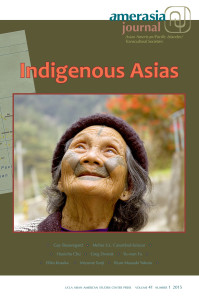 With its latest issue, Amerasia Journal explores how indigeneity is conceptualized within geographic boundaries and beyond into the diaspora. Guest edited by Greg Dvorak of Hitotsubashi University and Miyume Tanji of Australian National University, “Indigenous Asias” (Issue 41:1) engages local and global discussions of indigenous cultures and practices across the Pacific, including Hawai‘i, Japan, the Philippines, and Taiwan, that offer more complex understandings of cultural identity in today’s world. As the guest editors suggest, “when climate change and globalization threaten to overwhelm the entire world as we know it, indigenous peoples’ shared commitment to the environment, cultural heritage, and to the places for which they care so deeply sets a vital example for everyone.”
With its latest issue, Amerasia Journal explores how indigeneity is conceptualized within geographic boundaries and beyond into the diaspora. Guest edited by Greg Dvorak of Hitotsubashi University and Miyume Tanji of Australian National University, “Indigenous Asias” (Issue 41:1) engages local and global discussions of indigenous cultures and practices across the Pacific, including Hawai‘i, Japan, the Philippines, and Taiwan, that offer more complex understandings of cultural identity in today’s world. As the guest editors suggest, “when climate change and globalization threaten to overwhelm the entire world as we know it, indigenous peoples’ shared commitment to the environment, cultural heritage, and to the places for which they care so deeply sets a vital example for everyone.”
Guided by the guest editors’ call to examine “what exchanges exist between indigenous groups across regions” in the Asia Pacific, the contributions to this special issue consider how indigeneity defines, as well as complicates, ethnic identities in national as well as transnational frameworks. Addressing such concerns, Guy Beauregard offers insights on the life story of mixed-race writer/filmmaker Tony Coolidge and his attempts to identify with his indigenous Taiwanese lineage. Eliko Kosaka and Hueichu Chu, respectively, tackle how transpacific migrations have shaped Okinawan identity in literary texts such as Masao Yamashiro’s The Kibei Nisei and Sakiyama Tami’s “Island Confinement.”
Other contributors shed light on efforts of indigenous groups to assert a shared identity through political and cultural means. Ryan Masaaki Yokota interrogates Okinawan self-determination vis-à-vis United Nations protocols on indigenous rights, while Melisa Casumbal-Salazar points out the paradoxical way Philippine national culture treats indigeneity by attempting to celebrate the cultural production of once subjugated minority groups. Yu-wen Fu discusses the Taiwanese blockbuster film Seediq Bale and how it mobilized the political consciousness of the Seediq, one of the island’s recognized indigenous groups.
The issue also spotlights Peace Boat, a Japanese non-governmental organization that connects indigenous groups worldwide through educational voyages promoting peace and sustainability. Books reviewed in this issue include Yến Lê-Espiritu’s Body Counts: The Vietnam War and Militarized Refuge(es) and David Hanlon’s Making Micronesia: A Political Biography of Tosiwo Nakayama.
PDF of Amerasia Journal 41:1 Press Release
ORDERING INFORMATION
Copies of the issue can be ordered via phone, email, or mail. Each issue of Amerasia Journal costs $15.00 plus shipping/handling and applicable sales tax. Please contact the Center Press for detailed ordering information.
UCLA Asian American Studies Center Press
3230 Campbell Hall
Los Angeles, CA 90095-1546
Phone: 310-825-2968
Email: aascpress@aasc.ucla.edu
Facebook: http://www.facebook.com/AmerasiaJournal
Amerasia Journal is published three times a year: Spring, Summer/Fall, and Winter. Annual subscriptions for Amerasia Journal are $99.00 for individuals and $445.00 for libraries and other institutions. The annual subscription price includes access to the Amerasia Journal online database, with full-text versions of published issues dating back to 1971. Instructors interested in this issue for classroom use should contact the above email address to request a review copy.

 Amerasia on Facebook!
Amerasia on Facebook!